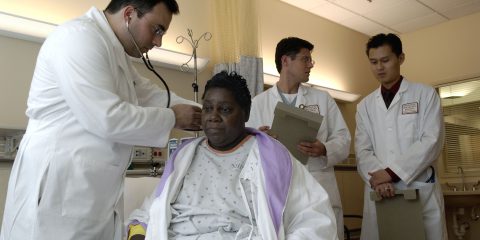According to research from the Pew Research Center, 68 percent of adults in the US get their news online on social media. Yet news, whether online or from traditional outlets, can be misleading. Spin is the term used to describe a slant in the way information is presented. Unfortunately, many journalists rely on press releases in their writing and story...
Read MorePatients Posts on Medivizor
Why Speaking Up Matters And Why It Is Difficult
Recently researchers added a question to a common survey that patients can complete after they are discharged from the hospital. The question – “How often did you feel comfortable speaking up if you had any problems in your care?” available answers included: “(1) no problems during hospitalization, (2) always felt comfortable...
Read MoreGuest Post: An Open Letter To Healthcare Providers
By Stephanie Zimmerman, RN, MSN Dear Healthcare Providers, Although professionally, I am a former pediatric oncology nurse practitioner, I write this letter as an individual who lives with the long-lasting impact of late effects stemming from the successful treatment of Ewing’s Sarcoma as a child in the late 1970’s. I write because I am fortunate to be...
Read More16 Insights From WorldWide Chat on Health Information Seeking
The world is flat guys, Twitter is awesome! #doctors20 — Ángel González (@angel189) February 2, 2015 Worldwide Conversation Only on Twitter can people around the world chat with each other in real-time about an issue that impacts so many. Monday February 2nd, a group of 114 people from places as different as South Africa, Belgium, Australia,...
Read More15 Tips to Cope with Scanxiety (Scan Anxiety)
“Keep Calm And Carry On:” Really? “The shock of that day you hear the words, ‘you have cancer’ never leaves you and your sense of certainty in life and in your body can be hard to recapture after a diagnosis of cancer.”-Marie Ennis-O’Connor After Surgery, Chemo, Radiation This is the time when feeling sick is supposed to be over. ...
Read More3 Reasons Doctors Need to Understand Patients Health Beliefs
Do physicians understand their patients? Writing for Scope blog, Jessica Rice described her experience asking difficult questions of her physicians. “I consider myself a down-to-earth, logical creature; looking at the facts and hearing the truth is strangely comforting to me. This is why I recently asked, ‘What will dying be like if it’s the...
Read More7 Reasons Why Patients Blog
Why do patients blog? Why do they reveal personal information and medical experiences on the Internet? 1) To Share Information Annette McKinnon, author of ‘Here’s Your Gold Watch, Rheutired,’ started her blog “to inform people about things I learned that seem obvious to me now, but were hard to learn.” Carolyn Thomas, author of “My Heart...
Read MoreBeep…beep…beep…
Anyone who has spent anytime in a hospital has heard the cacophony. Monitor alarms are actually messages to nurses and physicians; some are crisis, some warning, some just advisory alarms. Here’s one patient’s response… Annoying beeps, buzzers, tones and other noises make sleeping nearly impossible and even just resting difficult. But, patients...
Read MoreBullying in Nursing and Its Impact on Care
Do nurses eat their young? Renee Thompson asks. The answer may surprise you. “Nurses know we eat our young. Some nurses think it’s good to “toughen up” the new nurses. In reality it’s not. It decreases confidence and competence. “ Renee Thompson, nurse, author, educator and advocate for workplace change, is making it her...
Read MoreWhy I Became a Patient Engagement Evangelist
Physician Parents When your parents are both physicians, you have a unique perspective on the health care system. This is especially true for me because of the time when I grew up. During those days, on call physicians didn’t leave the phone calls to an answering service at night. Our phone would ring, my father would answer it at all hours and would...
Read MoreCommunicating about “Dr. Google”
In 2007 Scott Haig, an orthopedic surgeon, wrote “When a patient is a Googler” which was published in Time Magazine. He describes a patient that he names Susan, the “queen of Googlers.” “Every doctor knows patients like this. They’re called ‘brainsuckers.'” His article praises patients that are nurses and...
Read MoreIf It Ain’t Broke Don’t Fix It? OR How the US Got Its Cancer Care Crisis
Did you know… In a study conducted in 2012, 69% of patients diagnosed with stage 4 lung cancer and 81% of those diagnosed with stage 4 colorectal cancer did not understand that chemotherapy was not at all likely to cure their cancer? That a national survey showed physicians asked patients what they want in their care only ½ the time? That patients ask...
Read More














